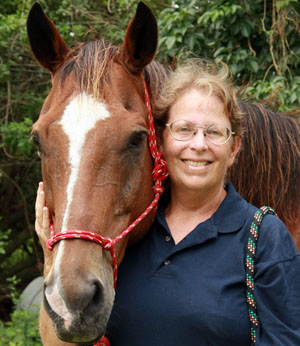TALES FROM THE TRAILS
Owning horses is a joy, but when disaster strikes, caring for them can quickly become a complex problem.
A few years back, parts of Palm Beach County were devastated by Tropical Storm Isaac. Some western areas, especially parts of Wellington, Deer Run, White Fences, Caloosa and the Acreage/Loxahatchee area, received days of pounding rain — more than 20 inches in total. Whole neighborhoods were flooded for days and, in some cases, weeks, with no way to drive in or out.
People were able to stay indoors safely, for the most part, but many barns and pastures flooded. Horses and other livestock ended up living in the water or standing on small dry islands, if they were lucky. People ran out of hay, feed and sources of fresh water. There was no way to move the horses out, other than hand-walking them, sometimes for miles. And even then, where could they go? Finding dry stalls was a huge problem.
Horses and livestock aren’t cats or dogs. You can’t pick them up and walk them out, or put them in the car and drive away. It was a real wake-up call to the horse community, and it gave birth to an idea.
HEN, the Horse Emergency Network, is a way for people to help each other when disaster strikes. It can be something as widespread as a hurricane or tropical storm, or as small and personal as breaking a leg or even falling on hard times. It’s a way for members of our local horse community to help each other.
Coordinated through the Wellington-WEF web site (www.wellington-wef.com), people can write posts detailing their problems and specific needs. Hopefully, others will then become aware of these troubles and help out.
Jill Townsend, owner and manager of the site, envisions it as a kind of clearinghouse. “I don’t think people should ask for money,” she said. “There are other sites that can help out that way, like gofundme.com. This is more for people who need some temporary help for a specific problem.”
Townsend sees it as a clearinghouse to bring people together. “This is a place to post if you are available to volunteer to help people in need,” she said. “It could be for a person who gets sick or injured and has pets or livestock. If you know someone who needs assistance, you could post it as well. Of course, if we have a big emergency, it could be a place to discuss that. Spread the word, and let’s see if we can assist people in need in our community.”
Often, it’s about personal difficulties.
“If someone breaks a leg, it’s really hard to get around to feed and muck out stalls,” Townsend said. “So they could post, asking if someone would be able to come out and help for a couple of weeks. Or if you know of someone in dire financial straits, maybe someone else could donate a couple of bales of hay. It’s a way for neighbors to help neighbors.”
If another weather-related disaster strikes, people can offer to help others by organizing transportation, trailering horses to better locations, or offering available dry pastures or dry stalls temporarily.
Others could transport feed, hay and shavings, offer to help with daily feeding and mucking out, rebuilding destroyed fences, help out with daily medical care like rebandaging wounds or giving medications, or anything else that horses always seem to need.
If you become aware of someone needing help, you can post for them, if they’re amenable. Others can post if they are available to help out in any capacity, on a temporary or on-going basis. It would be extremely helpful, as well as reassuring, to know that there are people out there ready and willing to help. Having a safety net in place in advance is something everyone with horses should keep in mind.
For many of us, it can be somewhat difficult to ask for help. We take it as a sign of weakness, or that we’ve failed to live up to our own expectations. However, when it’s our horses’ and livestocks’ health and well-being at stake, we should throw pride out the window. Another way of looking at it is by reversing the situation: if you saw someone whose horses needed help and you could come to their aid, would you hesitate?
Helping someone, and especially their animals, always feels good. It’s the right thing to do, and we should put the animals’ needs before our own self-importance. As the old saying goes, it is better to give than to receive. And sometimes easier, too.
If you have an emergency and need assistance caring for your horses or livestock, know someone else who does, or can offer to help out, visit www.wellington-wef.com, and post a note on the HEN message board.








